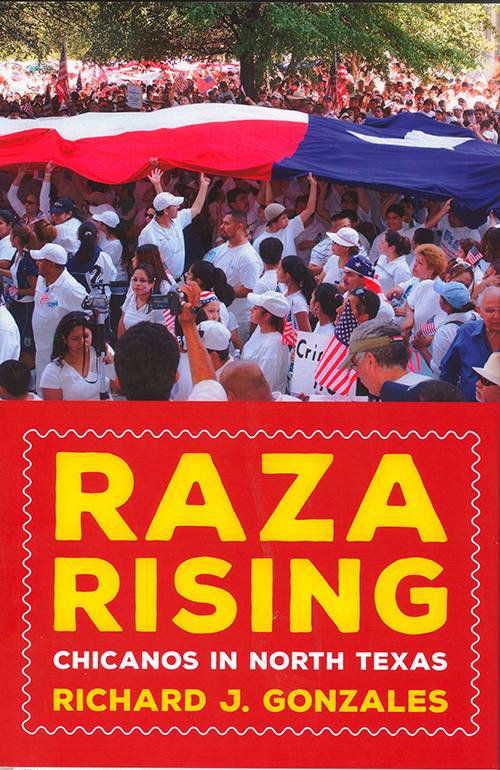Fight The Power

Raza Rising: Chicanos in North Texas
by Richard J. Gonzales
Denton: University of North Texas Press, 2016.
304 pp. $29.95 cloth.
Reviewed by
Sergio M. Martínez
The life, struggles and experiences of Chicanos around Fort Worth are the main themes in Richard J. Gonzales’s writings. The Fort Worth Star-Telegraph, for many years, has been the publishing vehicle for his articles. Raza Rising is the narrative that compiles his experiences, stories, articles, and the comments he wrote for the Fort Worth’s newspaper. This book also includes stories of other influential Chicanos who have impacted the Hispanic community in the Fort Worth region. The book is divided into four sections with each section starting with an anecdote or story that he is associated with. These narratives give each section a more intimate feeling, since they place the reader right at the center of Gonzales’s account of the events.
The book starts off with “School Blues,” which corresponds to the author’s childhood. Gonzales gives us an intimate look into his family’s experiences as immigrants and migrant workers in Illinois and Texas. A highlight of this section is the importance of teaching children the love for reading, and the key role that parents play in this quest. Gonzales also stresses the importance of speaking a second language and its importance in this country, this is especially critical for those people who work with migrant populations and those who wish to help Mexican migrant students in their native language.
In the second section, Gonzales recounts his experience with linguistic discrimination. He details his years as a schoolboy, when he was scolded in the classroom for speaking Spanish, which was common practice in Texas during that period of time. However, Gonzales explains that he found a source of pride in his bilingualism and biculturalism, and he never felt inferior or ashamed for it. Moreover, the author argues that discriminatory attitudes and practices towards Spanish speakers can have a profound effect and cause life-long pains and irreversible harm. Gonzales’s advice to the Chicano community, particularly families, is to continue teaching young Chicanos ethnic values and, most important, to love those values. One of the key chapters in this section, “Letters,” focuses on the importance of Chicano literary works and their many manifestations: theater, film, prose, and poetry and their relationship to the universal letter in the Spanish American world. For Gonzales, all the concepts in this section are the vehicle that will preserve and highlight Chicano cultural presence in Texas.
Next, Gonzales writes about his political activism. He explains his involvement in Chicano politics since 1968, when he was growing up in Chicago. When he moved to Texas in 1969, he noticed that not many Chicanos held public office, even though the Chicano population was substantial. Gonzales describes how several organizations, such as Association of Mexican American Students and La Raza Unida Party, played a key role in mobilizing the Chicano population politically. These and other groups organized themselves to support Chicanos to run for political positions and encouraged the Hispanic community to vote for their own representatives.
Another issue the author raises is the large number of Mexican Americans incarcerated in Texas prisons. Gonzales argues that this highlights the importance of existing Chicano representatives. Moreover, given the current political circumstances in the country, he emphasizes the need to expand the number of voters. As a solution, the author advocates for a coalition among minorities, including African Americans, Chicanos, and other minority groups, in order to work together.
The last section, “Chicano Roots,” is dedicated to explaining the need for a curriculum that emphasizes the Mexican American history and heritage of Texas. Gonzales demonstrates that as it stands today, the curriculum in Texas schools does not accurately represent the growing Chicano community in the state. Moreover, instead of addressing this blind spot, the State of Texas is in the process of adopting a controversial book about the Mexican American heritage of the state, which reproduces many stereotypes and does not contain an accurate representation of Chicano/a contributions and history in the state. Many experts have confirmed that this textbook is an offensive and false representation of the Mexican American community in Texas. In light of this, Gonzales offers an alternative to the deceptive representation the State of Texas wants to impress on the minds of our young students. In that sense, Gonzales offers not only an overview of the history of Tejanos in the state, but also a positive account of their participation in our civil and military foundational institutions.
Richard J. Gonzales’s Raza Rising: Chicanos in North Texas offers a personal history of the Chicanos in the Fort Worth. It is also a narrative that transcends Texas’s borders and could be assimilated to other places in the country with a substantial Chicano presence. It is not an overstatement to say that Mexican Americans and Chicanos are more visible than ever before, and will continue to grow in numbers in every corner of the United States. And that is why, as Gonzales argues, the establishment should “let us share our vision for a culturally inclusive, educated, economically robust United States of America with Chicano captains at the control … let us work hard and smart … and La Raza” will rise.
Sergio M. Martínez is an Associate Professor of Spanish at Texas State University.
